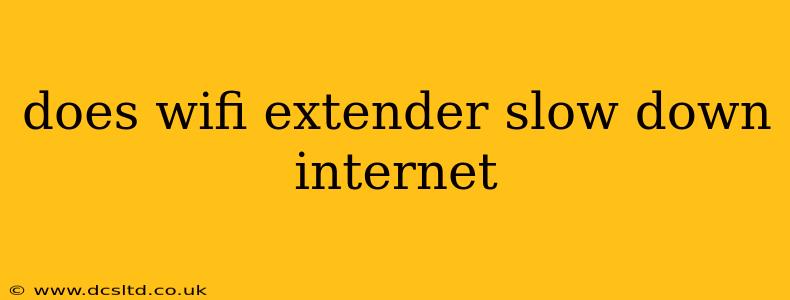The short answer is: yes, a WiFi extender can slow down your internet speed, but it doesn't have to. The degree of slowdown depends on several factors, and understanding these is key to optimizing your home network. This article will explore the reasons why extenders might reduce speeds and how to mitigate those issues.
How Do WiFi Extenders Work and Why Might They Slow Things Down?
WiFi extenders work by receiving your router's signal, boosting it, and rebroadcasting it. This process introduces several potential bottlenecks:
-
Signal Degradation: The extended signal is inherently weaker than the original signal from your router. The further you are from the extender, the weaker the signal becomes, leading to slower speeds and increased latency (lag). This is simply physics – the signal weakens as it travels.
-
Double the Distance: Data travels from your device to the extender, and then from the extender to your router. This doubles the distance the signal has to travel, potentially increasing latency.
-
Overlapping Channels: If your extender and router are operating on the same or overlapping WiFi channels, interference can occur, resulting in slower speeds for both networks. This is like having two conversations happening simultaneously on the same phone line – they'll both be muddled.
-
Older Extenders & Technology: Older extenders might use older Wi-Fi standards (like 802.11n) which are less efficient than newer standards (802.11ax, or Wi-Fi 6E). This technological gap will significantly affect the speed.
-
Network Congestion: Many devices connected to the extender can lead to network congestion, slowing down speeds for everyone. Think of it like a highway – the more cars, the slower the traffic.
-
Extender Placement: The placement of the extender significantly impacts performance. Poor placement can create dead zones or amplify interference.
What Kind of Speed Reduction Can I Expect?
The speed reduction varies greatly. You might see a decrease of 50% or more in some cases, while in others, the drop might be minimal. Factors influencing the extent of the slowdown include the quality of the extender, the distance from the router, the number of devices connected, and the original internet speed.
How Can I Minimize Speed Loss with a WiFi Extender?
Several steps can help you maximize the performance of your WiFi extender and reduce speed loss:
-
Choose a Powerful Extender: Invest in a high-quality extender that supports the latest Wi-Fi standards (Wi-Fi 6 or Wi-Fi 6E) and has strong performance capabilities.
-
Optimal Placement: Strategically place your extender to minimize distance from both the router and the devices you're trying to connect. Avoid placing it behind walls or other obstacles. Experiment with different locations to find the best signal strength.
-
Use a Different WiFi Channel: Configure your extender to operate on a different WiFi channel than your router to avoid interference. Many routers and extenders allow you to manually select channels.
-
Wired Connection (if possible): If feasible, connect your extender to your router using an Ethernet cable. This creates a wired backhaul, bypassing the wireless connection and significantly improving speeds. This is the most effective method for minimizing speed loss.
-
Upgrade Your Router: A powerful, modern router with good coverage can often reduce the need for an extender in the first place.
Is a WiFi Mesh System a Better Alternative?
Yes, WiFi mesh systems are often a superior alternative to extenders. Mesh systems consist of multiple nodes that work together to create a seamless, high-speed network. They generally offer better performance, wider coverage, and easier management compared to single extenders.
Are There Other Ways to Improve WiFi Speed Besides Using an Extender?
Absolutely! Consider these options:
-
Upgrade your internet plan: A faster internet plan will obviously improve speeds throughout your home.
-
Relocate your router: Placing your router in a central location, away from obstacles, significantly improves signal strength.
-
Check for interference: Identify and eliminate sources of interference, such as microwaves or cordless phones, which operate on similar frequencies.
By understanding the factors that influence extender performance and implementing these tips, you can significantly minimize speed loss and enjoy a more reliable WiFi network. Remember, a good extender combined with proper placement and configuration can still provide a significant improvement in your home's WiFi coverage.
